Pros
-
Thin and durable design
-
Snappy performance
Cons
-
Finicky trackpad
-
Short on ports
-
Mediocre battery life
The X1 Titanium Yoga is one of Lenovo's many additions to the ThinkPad line this year, furthering a push for thin, compact notebooks that compete with the likes of Dell and Apple in offices and homes alike. The X1 Carbon and X1 Yoga have carried this portion of the ThinkPad line for a while, but between the new X1 Nano, X1 Fold, X12 Detachable, and X1 Titanium Yoga, it's clear Lenovo is pushing to get more laptops on this side of the lineup. But even these super high-end designs can come with caveats.
About the Lenovo ThinkPad X1 Titanium Yoga
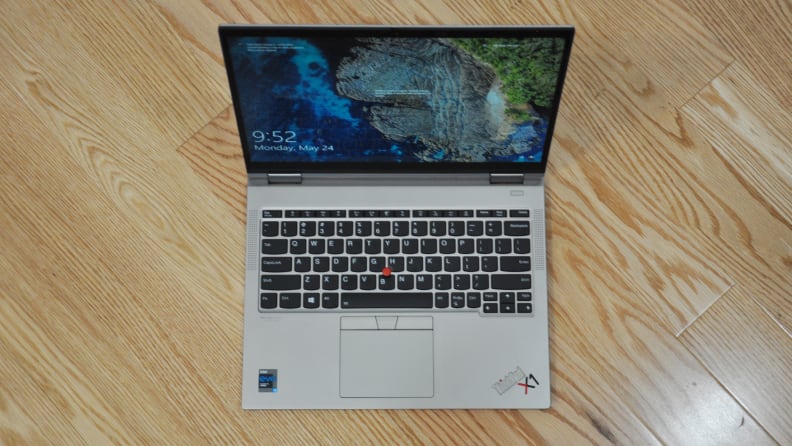
Lenovo's ThinkPads have undergone a radical transformation over the years.
The model we tested currently costs around $1,700 through Lenovo's site, though you can step the RAM and storage down for a model that's just under $1,500, or bump up the processor and other specs for a max of $2,300 on the top-end model.
Here are the main specs for our test unit:
- Processor: Intel Core i5-1130G7 (1.80GHz 4-core with up to 4.00 GHz Turbo Boost, and 8MB Cache)
- Storage: 512GB PCIe SSD
- Memory: 16GB LPDDR4X 4267MHz
- Display: 13.5-inch 2256x1504 IPS touch screen
- Battery: 44.5Wh battery
- Ports: 2x USB 4 Type-C with Thunderbolt 4 and DisplayPort, 1x headphone/microphone jack
- Connectivity: Intel Wi-Fi 6 AX201 (2x2) & Bluetooth 5.1
- Weight: 2.54 pounds
- Dimensions: 0.45 x 11.71 x 9.16 inches
What we like
It's unbelievably thin and durable
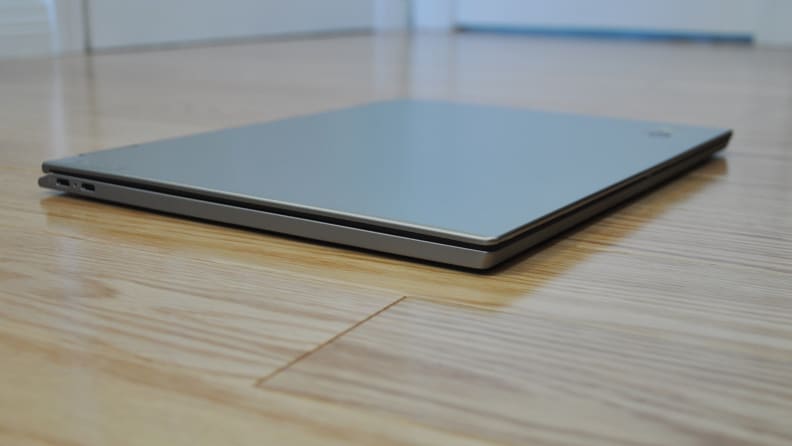
The ThinkPad X1 Titanium Yoga is one of the thinnest and lightest ThinkPads Lenovo has made to-date.
ThinkPads are known for their legendary durability, but the most robust models tend to feel a bit chonky—not so with the ThinkPad X1 Titanium Yoga. Lenovo has built an incredibly slim ThinkPad that also feels like it could take an incredible beating. The titanium, carbon, and magnesium chassis is stiff and hearty. The light coloring combined with its subtle texture feels like it would mask the small scratches that inevitably come with carrying a laptop around all day—something I worry about with most laptops with metal builds.
For reference, the standard ThinkPad X1 Yoga, which is already quite thin, is 4mm thicker than its Titanium sibling, with an aluminum chassis that can take a hit, but feels less premium than the Titanium's textured, less blemish-prone finish. The X1 Titanium isn't thinner than the X1 Carbon, but it's also a 2-in-1, and the Titanium is so thin it almost makes the 360-degree tablet mode feel like an actual tablet, rather than a laptop trying to pull bulky double-duty.
Performance is snappy, even on the lowest-tier model
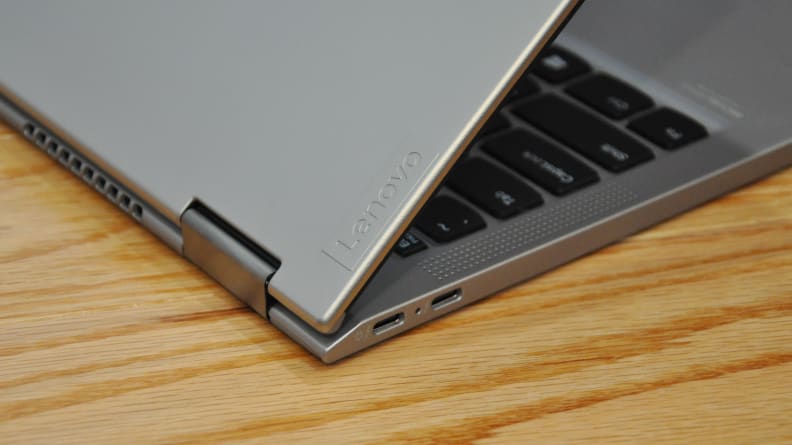
Lovely, tucked-back hinges.
While the X1 Titanium isn't going to be competing with high-end workstation laptops, the 11th generation Core i5 is no slouch. It garnered slightly better GeekBench scores than the latest Dell XPS 13, even though that was equipped with a higher-end i7 processor. While the Intel Evo platform doesn't live up to all its promises of stellar battery life (see below), it wakes from sleep instantly when you open the lid, which means you can get to work right away. The 16GB of RAM also ensures you can open plenty of browser tabs without the system slowing to a crawl.
That said, performance isn't all it could be thanks to its thermal design (the X1 Titanium reached 90 degrees and thermal throttled on three cores during our CPU benchmarks). That’s especially true when considering this machine’s price point. High costs are common among all ThinkPads, and high temperatures are common among most Intel laptops—but again, some top-tier competitors can do better in both regards. Whether most people will actually notice is up for debate, though.
What we don’t like
The trackpad is very finicky
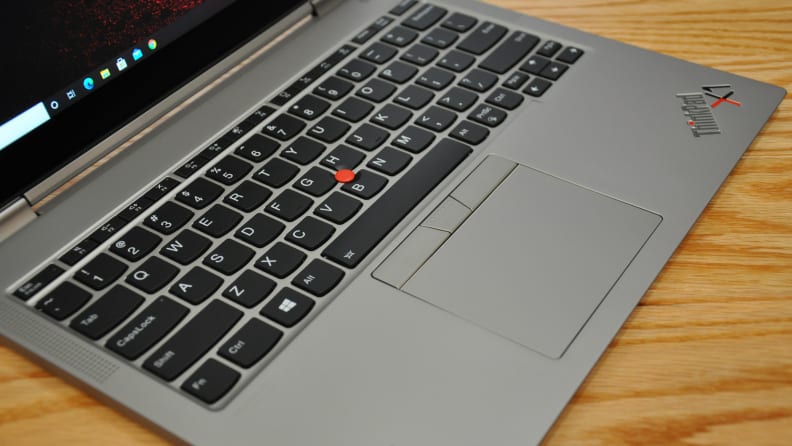
The keys have less travel than we would normally like to see.
The ThinkPad X1 Titanium Yoga uses a very unique trackpad from a company called Sensel. It uses a different method of tracking your finger as it glides across the surface, and without getting into the (fascinating) details, the tracking works well, accurately moving the cursor with your finger,and it even works if you're wearing gloves. However, the clicking mechanism—or lack thereof—is troublesome.
Much like the latest MacBooks, the X1 Titanium's trackpad doesn't actually click. Instead, it detects how hard you're pressing, and simulates a click with some haptic feedback. This eliminates one moving part from the device, which is good, since moving parts are a common point of failure. But unlike Apple's solution, it doesn't always work well.
I found it didn't do a good job of activating a click if my thumb was near the bottom of the trackpad, and while it offers some settings to adjust the sensitivity, it always felt either not sensitive enough or too sensitive. It’s easy to double click on accident. I wouldn't go so far as to call the trackpad objectively bad—some users may find it okay depending on how you rest your finger(s) on it—but others will find it more frustrating. You can, of course, use the red TrackPoint nub instead, and ThinkPad diehards may never touch the trackpad to begin with anyway for this reason.
Where have all the ports gone?
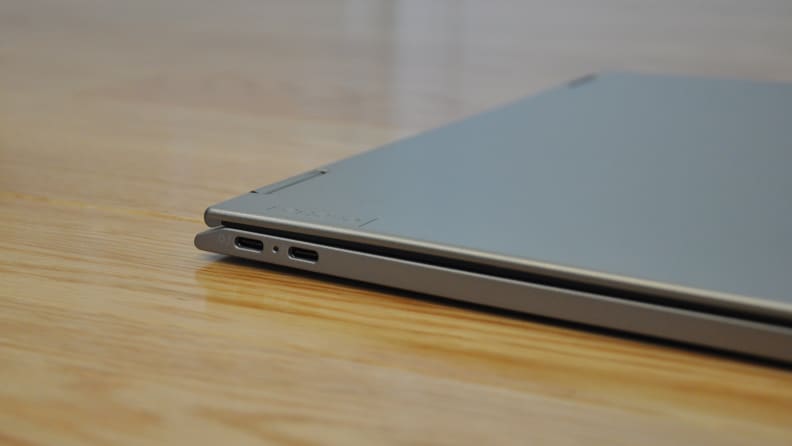
Missing more connectivity ports than we would like.
The ThinkPad line has a few things that make it what it is, but most of those things, like the comfortable keyboard and business-oriented port selection, suffer when you shrink the size. Lenovo's existing X1 laptops already walk this line, and the X1 Titanium Yoga shrinks the key travel just a tad more than its more affordable siblings. It's still good, but it's slowly moving away from the greatness in other ThinkPads like the C13 Yoga Chromebook or thicker business models.
More importantly, though, Lenovo has shrunk the connectivity to two measly USB-C ports. Compared to a standard X1 Yoga, which is only slightly thicker but contains USB-A and even a full-size HDMI, this feels like too big a sacrifice, especially for something brandishing the ThinkPad brand.
The X1 Carbon and X1 Yoga strike a near-perfect balance between form factor and usability, which help them stand out from the competition at Dell and HP. But the X1 Titanium Yoga follows those manufacturers' trends rather than bucking them. Even the fingerprint scanner is incredibly tiny and shoved in the corner rather than its usual spot next to the trackpad, which is fine but a little disappointing. That said, this machine also features facial recognition, so you may prefer to use that for quick logins anyway (though we recommend leaving the built-in webcam slider closed for privacy when not in use).
Battery life is nothing special
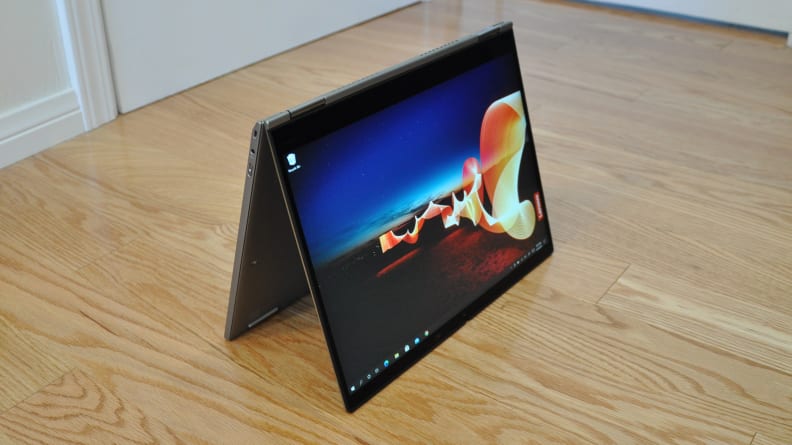
The ThinkPad X1 Titanium Yoga in tent-mode.
Building a thin laptop is always a game of tug-of-war, because the smaller you shrink the chassis, the harder it is to pack in the necessary performance and battery. Unfortunately, the latter is a clear sacrifice on this machine, lasting noticeably shorter than the competition from Dell, Apple, and others.
To test a laptop's battery, we set the display to 200 nits of brightness and cycle through web pages in Google Chrome until the machine dies, as an imitation of a typical user's workload. Our hope is that a laptop will last at least seven or eight hours, allowing you to make it through a workday without a charge. The X1 Titanium Yoga, unfortunately, only made it about five hours and 51 minutes before giving up the ghost, which is a bit paltry for a machine that's targeted at business usage. The Dell XPS 13, for example, lasted almost nine and a half hours in our tests, and the Apple M1 MacBook Air can go a full 12-hour day without a charge.
Should you buy it?
No, there are bits of greatness but it isn't there yet
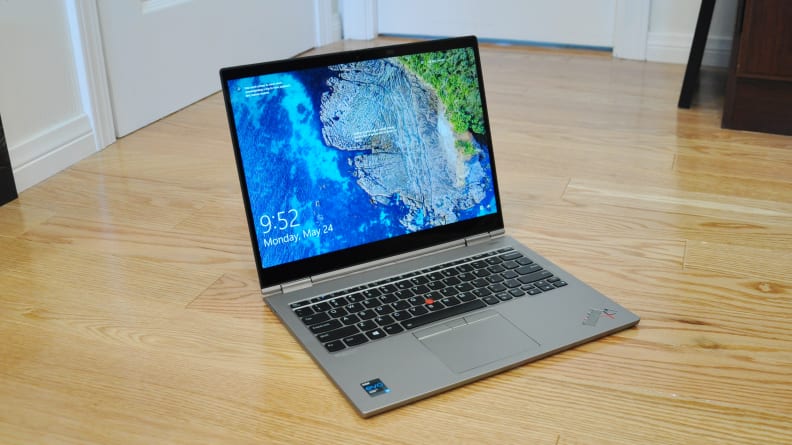
Hard to argue that this isn't is a good-looking laptop.
On paper, the X1 Titanium Yoga seems like a slam dunk: a thin yet super-durable machine with all the latest tech packed inside and out. The titanium chassis really is the perfect marriage of thinness and durability, and the 2-in-1 form factor works well when you want something portable. Like other super-compact ThinkPads, there are sacrifices made for that small size, like the keyboard and port selection, and they can make it hard to stomach the extra cost of the ThinkPad brand.
I might be willing to look past those sacrifices if Lenovo killed it in every other category, but that’s not the case here. While the trackpad’s new tech is undeniably exciting, it’s going to be problematic for a good number of users, which makes for a pretty serious shortcoming—after all, the trackpad is the primary way in which you interact with your machine. Coupled with sub-par battery life, you end up with a machine that's easily bested by the Dell XPS 13 and Apple M1 MacBook Air, both of which have equal or better performance, trackpads, and battery life (13 hours in the case of the MacBook). Both have shallower keyboards and equally disappointing port selection, but they're still going to be better for most people.
If you absolutely have to have that ThinkPad keyboard, you'll almost certainly be better off with one of Lenovo's other X1 machines like the X1 Carbon or X1 Yoga. If Lenovo can solve some of these woes on the next-gen X1 Titanium Yoga, this machine could be something truly special, but the first attempt misses the mark too much to recommend.
Meet the tester

Whitson Gordon
Freelance Writer
Whitson Gordon is a valued contributor to the Reviewed.com family of sites.
Checking our work.
Our team is here to help you buy the best stuff and love what you own. Our writers, editors, and experts obsess over the products we cover to make sure you're confident and satisfied. Have a different opinion about something we recommend? Email us and we'll compare notes.
Shoot us an email


